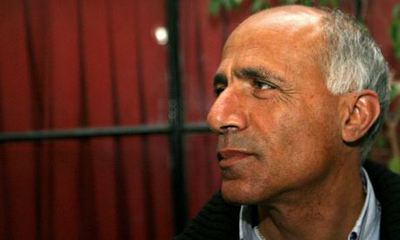|
|
An Easter letter about Mordechai Vanunu
an article by Paul Oestreicher (abridged)
. . . I have chosen to write today [Easter] about
one man who has accepted great suffering and
continues to do so in the hope that all people
might live in peace. No more than Jesus, whom he
has chosen to follow, does he lay claim to
greatness. He too was born into a Jewish family.
He too put his conscience before his safety. He
remains an outcast among his own people. His name
– I expect you may know it already - is Mordechai
Vanunu.

Mordechai Vanunu. Photograph: Gil Cohen Magen/Reuters
click on photo to enlarge
A newspaper which, over the past year, has shown
that it too is prepared to take risks for the sake
of conscience, has chosen Easter to re-tell his
story. Read it on this link to The Guardian article.
Many years have passed since I joined a group of
ordinary citizens, albeit some of us well known,
who went to Israel to appeal for Vanunu’s release
from prison. Our concern was for one human being.
We had no political agenda other than a plea for
compassion. We were received politely by the
President of Israel. Our plea was heard and
resolutely rejected. Many others have done the
same. An American family has legally adopted him
as their son. Few people remain sane after eleven
years in solitary confinement, a breach of
international law, and seven further years behind
bars. He has remained steadfast in his
convictions. He is now imprisoned in Israel, a
state whose citizenship he has renounced, yet
which will not allow him to leave.
What purpose is served in my writing this letter
to my friends? Perhaps it is no more than an
expression of my solidarity with one human being
that I want to share. If you pray, that is one
way, not the only way, of expressing your
solidarity. Perhaps you will send this letter to
others. What will it achieve? God knows. Perhaps
that’s the wrong question. What is not in question
is that what Vanunu wanted to achieve, to warn the
world of the danger of nuclear weapons, is as
relevant now as it has been since 1945. Only very
recently did Kofi Annan, former Secretary General
of the United Nations, remind the world that the
continuing presence of nuclear weapons leaves the
world on a dangerous yet largely unacknowledged
precipice.
In Britain the Campaign for Nuclear Disarmament,
of which I remain a Vice-President, working from
its offices in Mordechai Vanunu House, goes on
tirelessly appealing for the United Kingdom to
take seriously its lip service to non-
proliferation and therefore to abandon its Trident
Missile System. To join that campaign is one way
of honouring a courageous whistle-blower.
So, raise your voice for Mordechai Vanunu at every
opportunity. Who knows, maybe even Pope Francis will
when he visits Israel and Palestine next week.
Barbara, a long time peace campaigner who went to
prison in the cause, as I have not, joins me in this
Easter greeting, written in New Zealand, the only
country that has explicitly rejected nuclear weapons
on its soil or in its territorial waters.
|








|
DISCUSSION
Question(s) related to this article:
The courage of Mordecai Vanunu and other whistle-blowers, How can we emulate it in our lives?
* * * * *
Latest reader comment:
Whistle-blowers may be considered as very important actors for a culture of peace. As described on the CPNN page for values, attitudes and actions for a culture of peace, the culture of war is characterized by propaganda, secrecy, government control of media, militaristic language and censorship while the culture of peace is characterized by the free flow and sharing of information. Whistle-blowers break the back of secrecy directly and dramatically.
Mordecai Vanunu's courage continues the tradition of Daniel Ellsberg, who made known the Pentagon Papers during the Vietnam War and Karen Silkwood, who exposed nuclear pollution in the United States. Ellsberg was persecuted by President Nixon and Karen Silkwood was murdered, as described some years ago in a very fine film starring Meryl Streep.
As the amount of government secrecy continues to increase, we may expect that the number of whistle-blowers will also tend to increase in the years to come.

|
|









